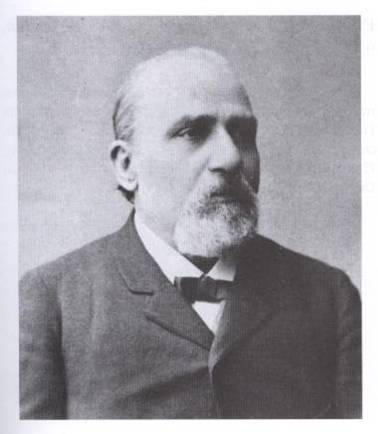|
Natko Nodilo
Natko Nodilo (31 August 1834 – 21 May 1912) was a Croatian politician, historian, journalist, university professor, and chancellor of the University of Zagreb. Born in Split, he studied theology in Zadar until 1856, when he dropped out of college and took a job as an auxiliary teacher at the Classical Gymnasium in Split. He received a degree in history and geography in Vienna in 1861. He then turned to politics, becoming the editor of the new magazine ''Il Nazionale'', in which he published articles on the principles of national and liberal politics. He was prosecuted in court because of his articles. After abandoning his job as editor, he worked as a teacher at the high school in Zadar and as a representative of the People's Party in the Parliament of Dalmatia, advocating the unification of Dalmatia with Croatia. In 1857 he was appointed as the first professor of general history at the University of Zagreb. After his term as chancellor for the 1890–91 academic year expire ... [...More Info...] [...Related Items...] OR: [Wikipedia] [Google] [Baidu] |
Croatia
, image_flag = Flag of Croatia.svg , image_coat = Coat of arms of Croatia.svg , anthem = "Lijepa naša domovino"("Our Beautiful Homeland") , image_map = , map_caption = , capital = Zagreb , coordinates = , largest_city = capital , official_languages = Croatian language, Croatian , languages_type = Writing system , languages = Latin alphabet, Latin , ethnic_groups = , ethnic_groups_year = 2021 , religion = , religion_year = 2021 , demonym = , government_type = Unitary parliamentary republic , leader_title1 = President of Croatia, President , leader_name1 = Zoran Milanović , leader_title2 = Prime Minister of Croatia, Prime Minister , leader_name2 = Andrej Plenković , leader_title3 = Speaker of the Croatian Parliament, Speaker of P ... [...More Info...] [...Related Items...] OR: [Wikipedia] [Google] [Baidu] |
Zagreb
Zagreb ( , , , ) is the capital and largest city of Croatia. It is in the northwest of the country, along the Sava river, at the southern slopes of the Medvednica mountain. Zagreb stands near the international border between Croatia and Slovenia at an elevation of approximately above sea level. At the 2021 census, the city had a population of 767,131. The population of the Zagreb urban agglomeration is 1,071,150, approximately a quarter of the total population of Croatia. Zagreb is a city with a rich history dating from Roman times. The oldest settlement in the vicinity of the city was the Roman Andautonia, in today's Ščitarjevo. The historical record of the name "Zagreb" dates from 1134, in reference to the foundation of the settlement at Kaptol in 1094. Zagreb became a free royal city in 1242. In 1851 Janko Kamauf became Zagreb's first mayor. Zagreb has special status as a Croatian administrative division - it comprises a consolidated city-county (but separate f ... [...More Info...] [...Related Items...] OR: [Wikipedia] [Google] [Baidu] |
Rectors Of The University Of Zagreb
Rector (Latin for the member of a vessel's crew who steers) may refer to: Style or title *Rector (ecclesiastical), a cleric who functions as an administrative leader in some Christian denominations *Rector (academia), a senior official in an educational institution ** Rector of the University of Edinburgh * Rector (politics) **Rector (Ragusa), an official in the government of the Republic of Ragusa *Rector (Islam) – the leading official of the Grand Mosque of Paris and of some other mosques Surname * Rector (surname) * David the Rector (1745–1824), Georgian pedagogue Places United States *Rector, Arkansas, city * Rector, Missouri, extinct town * Rector, Pennsylvania, unincorporated community * Rector Reservoir, a reservoir in Napa Valley, California Other *Rector Street (IRT Broadway–Seventh Avenue Line), a station on the IRT Broadway–Seventh Avenue Line of the New York City Subway *Rector Street (BMT Broadway Line), a station on the BMT Broadway Line of the New York C ... [...More Info...] [...Related Items...] OR: [Wikipedia] [Google] [Baidu] |
19th-century Croatian Historians
The 19th (nineteenth) century began on 1 January 1801 ( MDCCCI), and ended on 31 December 1900 ( MCM). The 19th century was the ninth century of the 2nd millennium. The 19th century was characterized by vast social upheaval. Slavery was abolished in much of Europe and the Americas. The First Industrial Revolution, though it began in the late 18th century, expanding beyond its British homeland for the first time during this century, particularly remaking the economies and societies of the Low Countries, the Rhineland, Northern Italy, and the Northeastern United States. A few decades later, the Second Industrial Revolution led to ever more massive urbanization and much higher levels of productivity, profit, and prosperity, a pattern that continued into the 20th century. The Islamic gunpowder empires fell into decline and European imperialism brought much of South Asia, Southeast Asia, and almost all of Africa under colonial rule. It was also marked by the collapse of the large ... [...More Info...] [...Related Items...] OR: [Wikipedia] [Google] [Baidu] |
People's Party (Dalmatia) Politicians
People's Party, Peoples Party or Popular Party may refer to one of the following political parties. Translations into English of the names of the various countries' parties are not always consistent, but ''People's Party'' is the most common. Current * Armenia: ** People's Party (Armenia) (current) ** People's Party of Armenia (current) * Aruban People's Party (founded 1942, nl, Arubaanse Volkspartij, links=no, pap, Partido di Pueblo Arubano, links=no, ''AVP'') * Austrian People's Party (founded 1945, (german: Österreichische Volkspartei, links=no, ''ÖVP'') * Cambodian People's Party (founded 1951, km, គណបក្សប្រជាជនកម្ពុជា, links=no, ', ''CPP'') * People's Party for Reconstruction and Democracy in the Democratic Republic of the Congo (founded 2002, french: Parti du Peuple pour la Reconstruction et la Démocratie, links=no, PPRD'') * People's Party of Canada The People's Party of Canada (french: Parti populaire du Canada, PPC) is a r ... [...More Info...] [...Related Items...] OR: [Wikipedia] [Google] [Baidu] |


